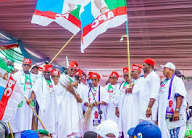Oshiomhole Urges Exemption, Warns Against Taxing Locally Made Goods

Senator Adams Oshiomhole has thrown his weight behind a policy stance that would spare products made in Nigeria from additional levies, arguing that taxing locally manufactured items penalises domestic producers and could undermine efforts to boost industrial output.
Speaking on the floor of the Senate and in subsequent media appearances, the Edo North lawmaker said it would be counterproductive to levy excise duties or other taxes on goods produced on Nigerian soil.
He said such charges, particularly on mass-market items, risk discouraging investment in local factories and increase costs for consumers who rely on home-grown supply chains.
Oshiomhole singled out several categories of products, including beverages manufactured within the country, suggesting that blanket taxation of those items made little economic sense and amounted to “punishing people for producing at home.”
He added that there are narrow exceptions such as products with clear public-health harms like tobacco which could remain subject to special levies on public-policy grounds.
The senator’s intervention comes amid renewed debates around tax reform proposals put forward by the executive and discussed across state and federal levels.
Some governors and stakeholders have already expressed concern over aspects of the proposed measures, arguing for negotiation and adjustments to protect both investors and consumers.
Oshiomhole urged that any tax overhaul be handled through consultation, with attention to how levies affect manufacturing competitiveness and job creation.
Economists and business leaders say the issue highlights a tension in Nigeria’s fiscal strategy: the need to broaden revenue sources while not stifling the very private-sector activity that creates employment and domestic value.
Small and medium manufacturers, in particular, fear that higher production costs would erode margins and encourage informalisation or offshoring of output. Advocates for targeted exemptions say well-designed tax breaks can spur local content and make Nigerian products more affordable and exportable.
Critics, meanwhile, warn against blanket carve-outs that could shrink government revenue needed for public services. They call for a calibrated approach — temporary or phased incentives, sector-specific reliefs, and strong compliance rules — so that tax policy supports industrialisation without creating loopholes or unfair advantages.
As the debate continues in legislative and executive circles, Oshiomhole’s position is likely to influence discussions on how fiscal reforms balance revenue mobilisation with industrial policy.









